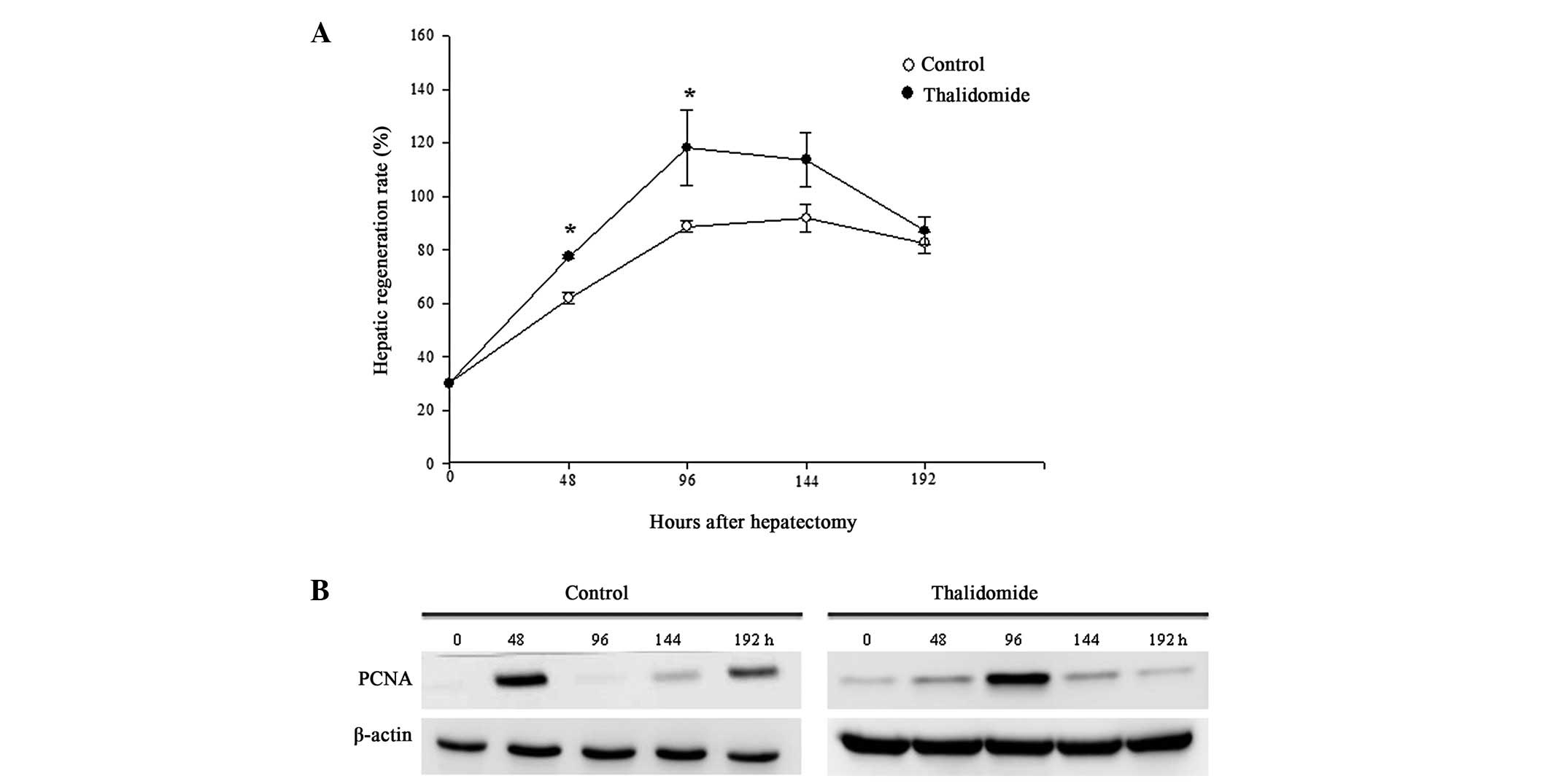|
1
|
Michalopoulos GK and DeFrances MC: Liver
regeneration. Science. 276:60–66. 1997. View Article : Google Scholar
|
|
2
|
Mohammed FF and Khokha R: Thinking outside
the cell: proteases regulate hepatocyte division. Trends Cell Biol.
15:555–563. 2005. View Article : Google Scholar : PubMed/NCBI
|
|
3
|
Fausto N, Laird AD and Webber EM: Liver
regeneration. 2 Role of growth factors and cytokines in hepatic
regeneration. FASEB J. 9:1527–1536. 1995.PubMed/NCBI
|
|
4
|
Drixler TA, Vogten MJ, Ritchie ED, et al:
Liver regeneration is an angiogenesis-associated phenomenon. Ann
Surg. 236:703–712. 2002. View Article : Google Scholar : PubMed/NCBI
|
|
5
|
Taniguchi E, Sakisaka S, Matsuo K,
Tanikawa K and Sata M: Expression and role of vascular endothelial
growth factor in liver regeneration after partial hepatectomy in
rats. J Histochem Cytochem. 49:121–130. 2001. View Article : Google Scholar : PubMed/NCBI
|
|
6
|
Leung DW, Cachianes G, Kuang WJ, Goeddel
DV and Ferrara N: Vascular endothelial growth factor is a secreted
angiogenic mitogen. Science. 246:1306–1309. 1989. View Article : Google Scholar : PubMed/NCBI
|
|
7
|
McBride WG: Thalidomide embryopathy.
Teratology. 16:79–82. 1977. View Article : Google Scholar : PubMed/NCBI
|
|
8
|
D’Amato RJ, Loughnan MS, Flynn E and
Folkman J: Thalidomide is an inhibitor of angiogenesis. Proc Natl
Acad Sci USA. 91:4082–4085. 1994.
|
|
9
|
Kenyon BM, Browne F and D’Amato RJ:
Effects of thalidomide and related metabolites in a mouse corneal
model of neovascularization. Exp Eye Res. 64:971–978. 1997.
View Article : Google Scholar : PubMed/NCBI
|
|
10
|
Kruse FE, Joussen AM, Rohrschneider K,
Becker MD and Völcker HE: Thalidomide inhibits corneal angiogenesis
induced by vascular endothelial growth factor. Graefes Arch Clin
Exp Ophthalmol. 236:461–466. 1998. View Article : Google Scholar : PubMed/NCBI
|
|
11
|
Singhal S, Mehta J, Desikan R, et al:
Antitumor activity of thalidomide in refractory multiple myeloma. N
Engl J Med. 341:1565–1571. 1999. View Article : Google Scholar : PubMed/NCBI
|
|
12
|
Little RF, Wyvill KM, Pluda JM, et al:
Activity of thalidomide in AIDS-related Kaposi’s sarcoma. J Clin
Oncol. 18:2593–2602. 2000.
|
|
13
|
Hsu C, Chen CN, Chen LT, et al: Low-dose
thalidomide treatment for advanced hepatocellular carcinoma.
Oncology. 65:242–249. 2003. View Article : Google Scholar : PubMed/NCBI
|
|
14
|
Pinter M, Wichlas M, Schmid K, et al:
Thalidomide in advanced hepatocellular carcinoma as antiangiogenic
treatment approach: a phase I/II trial. Eur J Gastroenterol
Hepatol. 20:1012–1019. 2008. View Article : Google Scholar : PubMed/NCBI
|
|
15
|
Schwartz JD, Sung M, Schwartz M, et al:
Thalidomide in advanced hepatocellular carcinoma with optional
low-dose interferon-alpha2a upon progression. Oncologist.
10:718–727. 2005. View Article : Google Scholar : PubMed/NCBI
|
|
16
|
Patt YZ, Hassan MM, Lozano RD, et al:
Thalidomide in the treatment of patients with hepatocellular
carcinoma: a phase II trial. Cancer. 103:749–755. 2005. View Article : Google Scholar : PubMed/NCBI
|
|
17
|
Folkman J: Angiogenesis in cancer,
vascular, rheumatoid and other disease. Nat Med. 1:27–31. 1995.
View Article : Google Scholar : PubMed/NCBI
|
|
18
|
Higgins GM and Anderson RM: Experimental
pathology of the liver - restoration of the liver of the white rat
following partial surgical removal. Arch Pathol. 7:187–202.
1931.
|
|
19
|
Kwon AH, Uetsuji S, Yamamura M, Hioki K
and Yamamoto M: Effect of administration of fibronectin or
aprotinin on liver regeneration after experimental hepatectomy. Ann
Surg. 211:295–300. 1990.PubMed/NCBI
|
|
20
|
Garcia N Jr and Sanyal AJ: Laboratory
assessment of hepatic hemodynamics. Clin Liver Dis. 5:591–615.
2001. View Article : Google Scholar
|
|
21
|
Arvidsson D, Svensson H and Haglund U:
Laser-Doppler flowmetry for estimating liver blood flow. Am J
Physiol. 254(4 Pt 1): G471–G476. 1988.PubMed/NCBI
|
|
22
|
Sun Z, Klein AS, Radaeva S, et al: In
vitro interleukin-6 treatment prevents mortality associated with
fatty liver transplants in rats. Gastroenterology. 125:202–215.
2003. View Article : Google Scholar : PubMed/NCBI
|
|
23
|
Lopez-Talavera JC, Cadelina G, Olchowski
J, Merril W and Groszmann RJ: Thalidomide inhibits tumor necrosis
factors alpha, decreases nitric oxide synthesis, and ameliorates
the hyperdynamic circulatory syndrome in portal-hypertensive rats.
Hepatology. 23:1616–1621. 1996.
|
|
24
|
Bockhorn M, Goralski M, Prokofiev D, et
al: VEGF is important for early liver regeneration after partial
hepatectomy. J Surg Res. 138:291–299. 2007. View Article : Google Scholar : PubMed/NCBI
|


















